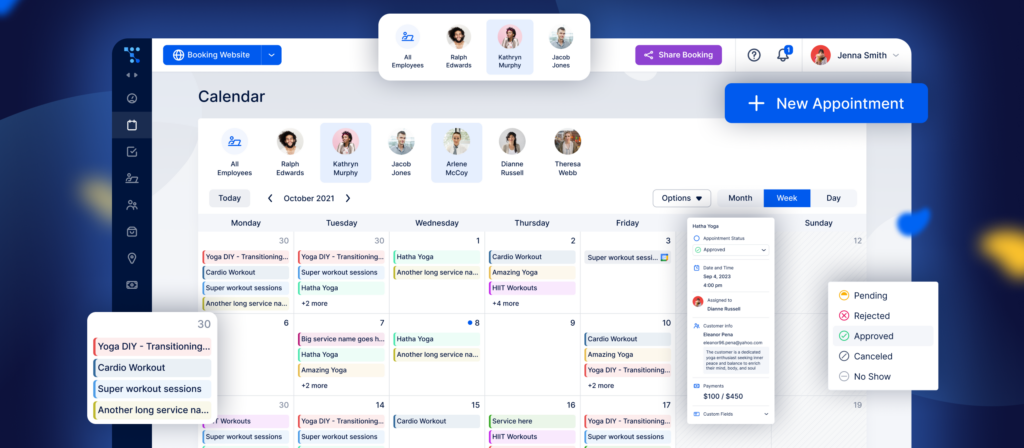Mentors play a decisive role in the lives of their mentees. As the mentees are making a start in the real world, what they have learned in school will not be enough for them to thrive.
Establishing a successful mentoring relationship might not be easy. But the outcomes of making a conscious effort are rewarding for both parties. Fulfilling mentor responsibilities is essential. You must create a healthy bond with mentees to promote their growth and well-being.
What are Your Duties as a Mentor?
Mentors are tutors, advisors, helpers, and supporters. They keep up with their mentees’ progress. And the aid they provide encourages pupils to develop both as individuals and professionals.
To establish a respectful and friendly bond, you should show genuine interest. If your mentee trusts you, it will be easier for you to help them grow.
Foster Confidentiality
From the first day, you should show your mentee that you trust and respect them so they can do the same. Confidentiality is a critical element within a mentoring relationship. With time, you will share knowledge, but also personal experiences and beliefs.
A mentee will only be open-minded to your advice and guidance if they can rely on you. In much the same way, you will only invest in the relationship if you feel respected as a mentor. Genuine trust and efficient cooperation are essential for success.
Make Yourself Available
Effective mentoring takes time. The bond between mentor and mentee is a long-term relationship. You must commit and make changes to your schedule to accommodate your duties as a mentor.
Keep regular contact, plan meetings, and prepare for them. Research teaching methods and valuable resources, and create opportunities to solve problems. Be there for your mentee, listen, and give encouragement. These are all activities that require time.
Listen to Understand Your Mentee’s Goals
A mentoring relationship should focus on the development and progress of the mentee. As a mentor, you should know how to listen and adapt to their career goals. Listening to understand and not to respond will aid your comprehension of their objectives.
Learning what your mentee wants to accomplish allows you to offer more suitable suggestions. Fulfilling mentor responsibilities with these goals in mind produces excellent outcomes. It encourages your mentee to correspond with your efforts.
Consider How to Be Most Helpful
Mentoring cannot be a standardized process. Different training methods will work best with each mentee. Thus, mentors should take time to think about their approach and teaching systems.
Adapting the mentoring process to each mentee demands careful consideration. But the effects of making such an effort are incredible. An effective mentor can provide learning opportunities to benefit their mentee’s professional career.

Come Prepared for Every Meeting
A mentor should be able to guide and advise, whether during formal or informal conversations. To do this, they ought to keep regular contact with mentees.
They need to know their obstacles and insecurities and be up to date with their progress.
Coming prepared for every meeting shows sincere personal interest. Mentees feel appreciated and free to share the difficulties they face. Mentors must primarily aim to listen. Then, prepare to make thoughtful interventions and have helpful resources at hand.
Preparing for meetings involves planning the topics to approach. Establishing an agenda helps to maintain organized and productive discussions.
Cultivate a Teacher and Pupil Relationship
Being a mentor includes evaluating performance, giving feedback, advising, and guiding. A mentee should be open to the wisdom their mentor shares. They should also be able to trust and confide in them.
As they develop their skills and build a prosperous career, their mentor becomes a counselor and genuine friend. Hence, a teacher-and-pupil dynamic is perfect for mentoring relationships.
Build Trust Through Engagement
Consistent engagement is key to building a lasting mentoring relationship. Questioning, listening to understand, and stimulating creativity are all forms of engagement.
Mentors have the training and development of the mentee as an ultimate goal. But, despite that, they should soon realize they grow along the way, too. Their limits are also pushed, and their skills are tested. Going through the journey together is what creates trust.
Withhold Judgment
Giving constructive feedback is essential to providing guidance and helping your mentee grow. Judging their goals, performance, or expectations will not encourage mutual trust. Doing so would only be prejudicial to your relationship.
As a mentor, you must remember that each person sees life differently and has their own goals. Even if you disagree with your mentee’s vision, try showing them new ways to look at situations. But do not try to force your viewpoints on them.
Communicate Advice and Guidance
Excellent communication is vital for any relationship, and mentoring is no exception. A mentor must communicate in a way that is understandable and calm. Be aware that, in the beginning, a mentee might not always share their doubts and difficulties.
Being approachable stimulates their willingness to participate more actively in the relationship. Soon, they will be ready to hear your opinions and accept any corrections you make. Mentors ought to support and teach good communication habits.
Encourage Reflection and Highlight Growth
Encouragement nourishes growth. As a mentor, you are a sounding board to your mentee. You need to be there throughout the learning process. You need to hear their ideas, encourage them to reflect on each one, and show them new viewpoints.
Remind them of their genuine motivations and goals. They will not see how far they have come and how much they have progressed on their own. They need to have your support and honest feedback as they develop. The part of all mentors is to provide a safe space that promotes progress.

Hold Mentees Accountable
Despite your efforts, the mentee is the one responsible for their own development. Mentoring often grows into friendship.
But you will not always be there to provide the necessary direction. After listening to and considering their goals, you must hold them accountable for their progress.
During meetings, you should plan to check together the progress they have made so far. Then allow some time for them to share what has helped them.
And try to understand what has troubled them or blocked their evolution. This way, you can also adapt your approach to be more efficient.
Connect Your Mentees to Others
Networking is crucial for professional development in most lines of work. You can provide opportunities for your mentee to meet new people within the industry. It will open their minds to new realities and offer them unique growth possibilities.
Introduce them to successful university colleagues and make arrangements to attend events. Organize casual occasions for them to get to know each other better and encourage collaboration.
Your mentorship success story starts with a scheduling app to streamline your calendar
Staying organized has never been easier.
You can now manage your business and grow your brand with a single, powerful software that keeps all of your appointments in line, your clients organized and your business booming.
Trafft is perfect for business owners who need to streamline their booking experience both for their staff and their clients.

Trafft handles everything for you, even sending automated email or SMS reminders to your clients. No-shows? Not anymore!
The Trafft booking software adapts to different industries for a blissful online booking experience and employee management.
Want to know more? Check out Trafft's awesome features to see what you are missing.
The Different Roles of a Mentor
Assuming different roles according to pupils’ needs is vital. These roles promote a successful relationship with positive outcomes.
Resource Person
There is a panoply of resources you can provide to your mentee. Suggest books, programs, and lectures, and provide opportunities for them to establish new contacts. If you can pinpoint what your mentee needs, you will be able to recommend the right resources for them.
Coach/Advisor
Just like coaches, mentors analyze performance and create opportunities for needed guidance. They provide reliable insights and direction based on experience. Constructive criticism promotes efficient teamwork with the mentee’s progress in mind.
Devil’s Advocate
Playing devil’s advocate promotes the skill and efficiency of your mentees. They will understand that there are different points of view and approaches to each situation. This knowledge will allow them to make solid, dependable judgments.
Champion
As a champion, you become more than a role model. You are there to support them through wins and defeats.
Celebrate their accomplishments and inspire them to continue growing. Occasionally, remind them how far they have come, but show them what they can still do to improve.
Roles and Responsibilities of Both Partakers in a Mentoring Relationship
A successful relationship demands more than the fulfillment of the above mentor responsibilities. Beside showing commitment, there are other crucial duties to share.
First, it is necessary to establish a degree of confidentiality that both the mentor and mentee would be comfortable with, thus allowing for the most meaningful aspects—trust and respect—to develop.
Each individual has the right to be respected and should be able to trust the other.
As the conversation progresses, both have a responsibility to offer regular feedback. Doing so helps them merge communication styles. When both parties adapt their approaches to each other, joint understanding improves.
With time, it is helpful to comprehend which core values the each share. Despite seeming unimportant, sharing specific core values strengthens bonds. This knowledge reinforces mutual trust, promotes progress, and encourages commitment.
Another significant role is that of the curious questioner. Mentors and mentees should feel free to ask curious and open questions. Not only to fortify the mentoring relationship but also to reason with each other. This way, they cooperate to extend their wisdom and skills.
Finally, the mentee needs to feel secure within the relationship. And the mentor gets to continue providing efficient support for their successful learning.
FAQs about mentor responsibilities
1. What are the key responsibilities of a mentor?
The main duties of a mentor include giving direction and counsel, imparting knowledge and experience, establishing goals and action plans, providing constructive criticism, and assisting in the career growth of their mentee.
In addition, a mentor should retain confidentiality, build trust and respect with their mentee, and serve as an example of appropriate conduct.
2. How often should a mentor meet with their mentee?
The requirements and desires of both parties will determine how frequently mentor-mentee encounters occur.
Nevertheless, it is typically advised that mentors and mentees meet at least once a month or more frequently as required to discuss any difficulties or advancements made toward goals. It could also be required to maintain regular contact by email or some other channel.
3. What types of guidance and advice should a mentor offer their mentee?
Based on their knowledge and experience, a mentor should provide direction and counsel. They should offer solutions to overcome obstacles and assist their mentee in identifying their strengths and shortcomings.
Moreover, mentors should provide their mentees with support and encouragement and work to instill confidence in their skills.
4. What are the best practices for setting and achieving goals with a mentee?
The greatest strategies for defining and attaining goals with a mentee include setting clear and practical objectives, creating action plans, and keeping track of results.
Also, mentors must assist their mentees in overcoming any difficulties or difficulties they may have, providing encouragement and advice as needed.
5. How can a mentor provide constructive feedback to their mentee?
One of a mentor's most important duties is to give constructive criticism. Feedback should be timely, precise, and concentrated on the mentee's areas of strength and progress. Mentors must also offer advice on how to resolve any problems brought up in the feedback.
6. How should a mentor handle disagreements or conflicts with their mentee?
Each mentoring relationship may experience conflicts or disagreements. Mentors need to be ready to respond to these circumstances with compassion and understanding. They ought to consider their mentee's viewpoint and strive to come up with a workable solution.
7. What role should a mentor play in their mentee's career development?
The career development of a mentee should be actively supported by the mentor. This could be giving their mentee networking opportunities, career guidance, or introductions to other experts in their industry. In addition, mentors should assist their mentees in defining their long-term objectives and developing a strategy to reach them.
8. How can a mentor help their mentee build a professional network?
Growing your professional network is crucial for job advancement. A mentor can support their mentee by connecting them with other experts in their field, giving them networking tips, and giving them the chance to attend industry events.
Also, mentors ought to support their mentees' involvement in professional development activities.
9. What are some ethical considerations that mentors should keep in mind?
Any mentoring relationship must take ethics into account. Mentors ought to respect boundaries, maintain confidentiality, and abstain from any conflicts of interest.
They should also follow professional norms and refrain from actions that can jeopardize the trustworthiness of the mentoring relationship.
10. How can mentors assess the progress and success of their mentoring relationship with their mentees?
By reviewing the objectives established at the start of the relationship and monitoring the mentee's progress toward reaching them, mentors can gauge the development and success of their mentoring relationship.
Also, mentors should ask their mentees for comments on how they can enhance their mentoring and provide ideas for future development.
Conclusion on Mentor Responsibilities
Mentors are essential elements within any organization. They help each mentee grow, adapt, and develop. To support learning, they provide them with competencies that will be valuable throughout their whole lives.
Do not take mentor responsibilities lightly. You want to welcome and get to know your mentee. You also want to give them space to improve and empower them to continue maturing.
No matter the program or method used, you can produce rewarding mentoring relationships with a real future.
If you enjoyed reading this article about mentor responsibilities , you should read these as well:
- The Many Types of Life Coaching Businesses You Can Start
- The Best Life Coaching Niches You Should Know About
- Social Media Marketing For Photographers: How To Do It Properly






